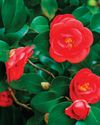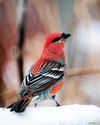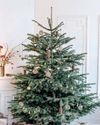يحاول ذهب - حر
modern mini MAKEOVERS
August/September 2021
|Birds & Blooms
THE SHRUBS IN GRANDMA’S BACKYARD MAY BE HUGE, BUT THEY’RE CLASSICS FOR A REASON. CHECK OUT WHAT THE NEXT GENERATION OF TRADITIONAL SHRUBS HAS TO OFFER.

Fairytrail Bride Cascade hydrangea
Maxing out at only 4 feet tall and wide, this shrub can be used in nearly any size space —even in a pot.
IT’S HARD TO BEAT THE SPECTACULAR FLOWER SHOWS OF GRANDMA’S FORSYTHIA, WEIGELA AND OTHER OLD-FASHIONED SHRUBS.
Fast-growing, long-living and tough as nails, they’re generally untroubled by insects, disease or even deer. There’s just one problem: They’re too big for today’s gardens! Most reach 8 to 10 feet tall and wide, making them fantastic solo specimens in a landscape or as a hedge but oversized for most beds or pots.

This is where plant breeders come to the rescue. Thanks to their work, you can enjoy downsized versions—half-size or even smaller. New varieties also offer longer bloom periods, reblooming or colored foliage that appeals from spring to fall. “A big part of my job is just keeping up on what those plant breeders are up to!” says Georgia Clay, a new plants manager for Monrovia. “We trial and evaluate thousands of varieties from all over the world and bring to market only the very best performers.”

هذه القصة من طبعة August/September 2021 من Birds & Blooms.
اشترك في Magzter GOLD للوصول إلى آلاف القصص المتميزة المنسقة، وأكثر من 9000 مجلة وصحيفة.
هل أنت مشترك بالفعل؟ تسجيل الدخول
المزيد من القصص من Birds & Blooms

Birds & Blooms
Ready to Fly
For birders, spring migration is something to look forward to and be celebrated, but how do birds know when it's time to begin their travels?
2 mins
December 2025 / January 2026

Birds & Blooms
COOL AS A Camellia
When temperatures drop, most plants wait out the chilly months, but camellias put on a show. Discover how to have these beauties thriving in your yard.
2 mins
December 2025 / January 2026

Birds & Blooms
Festive Feathers
Readers braved the winter chill to capture these snowy snapshots of the season's most beautiful birds
2 mins
December 2025 / January 2026

Birds & Blooms
Winter Gems
With raspberry-red feathers, pine grosbeaks cheer up chilly landscapes wherever they land
2 mins
December 2025 / January 2026

Birds & Blooms
the mysterious lives of NIGHTHAWKS
These creatures of contradiction aren't hawks and aren't the most active at night, but they are worth knowing
3 mins
December 2025 / January 2026

Birds & Blooms
Adventure Awaits
Pack your bags, get on board and find your next vacation destination in these captivating photos from far-flung travels
2 mins
December 2025 / January 2026

Birds & Blooms
It's All in the Needles
Get to know the greenery to identify these conifers
1 min
December 2025 / January 2026

Birds & Blooms
Christmas Tree Do's and Don'ts
These pro tips will help you get the most out of this classic holiday fixture
2 mins
December 2025 / January 2026

Birds & Blooms
Trailing Houseplants
Simple, easy-to-grow plants for hanging containers
3 mins
December 2025 / January 2026

Birds & Blooms
Better Off with Bats
Rethink the unsung heroes of the night and why you should support them
2 mins
October / November 2025
Translate
Change font size

